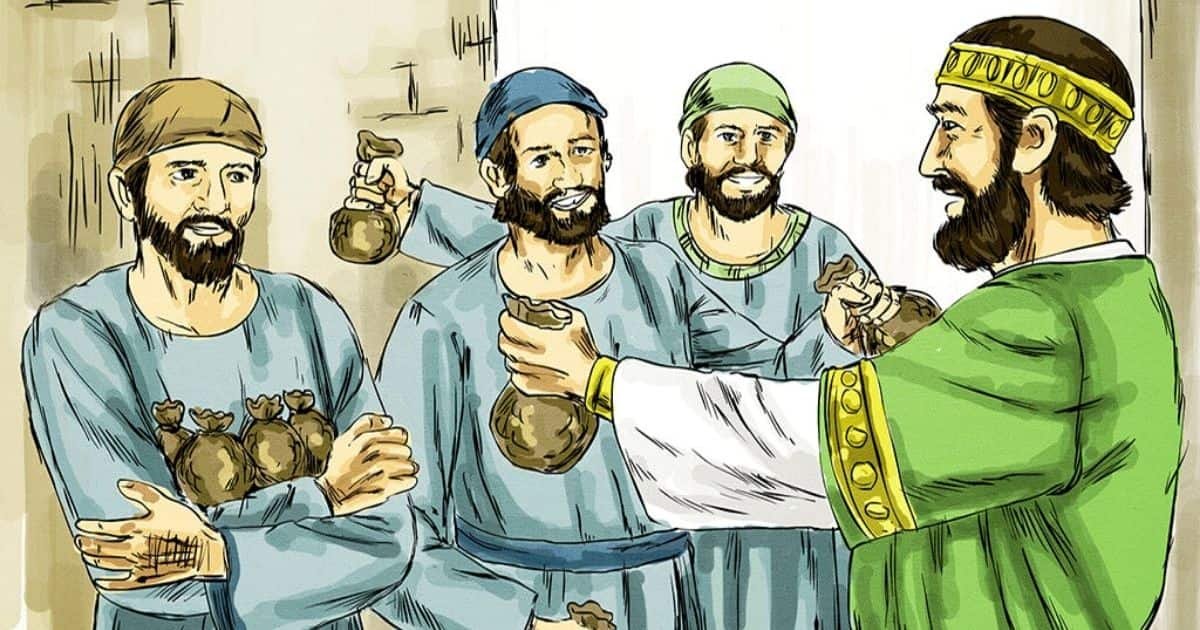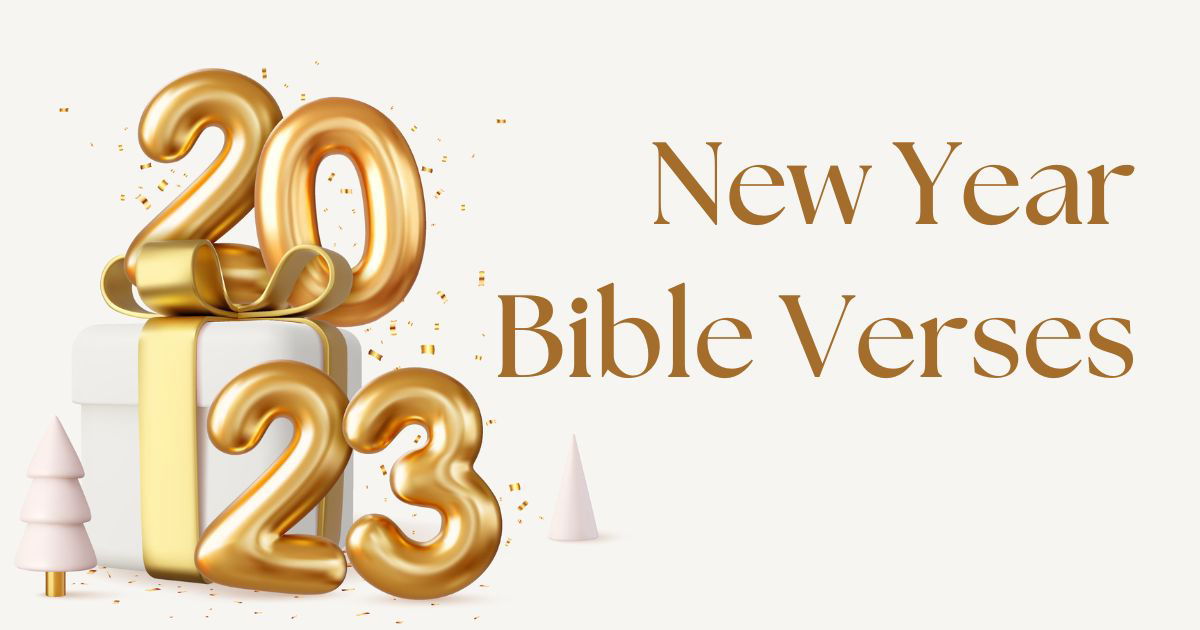Weddings in biblical times were rich with meaning and tradition. While our modern ceremonies might last a few hours, ancient Middle Eastern weddings involved customs that could span days or even years.
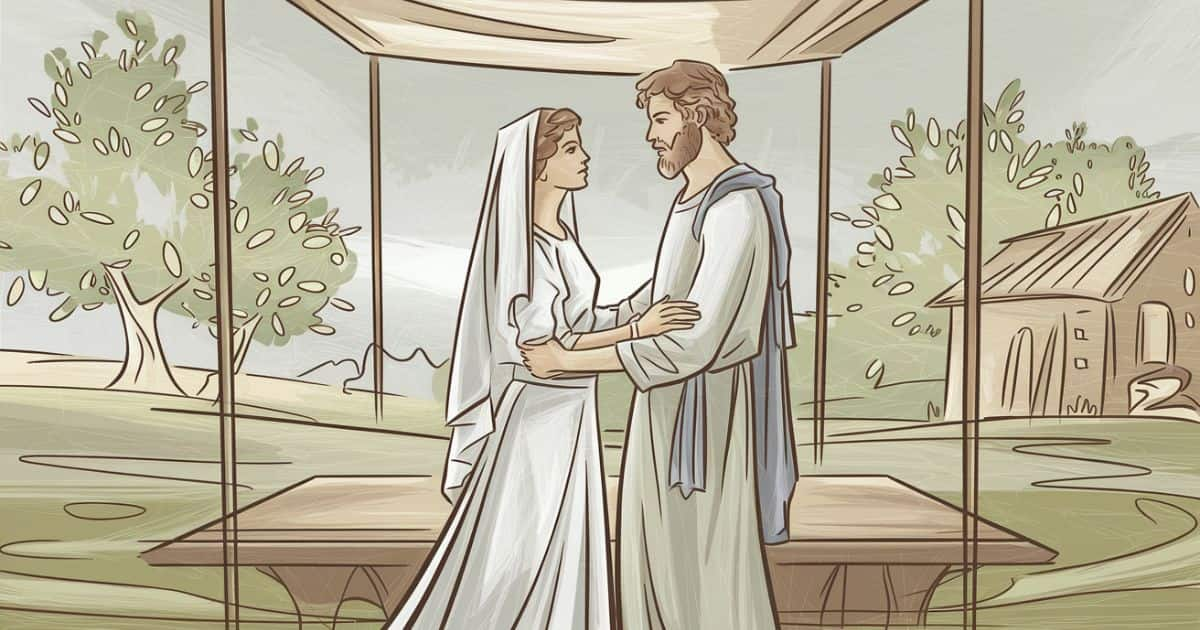
The people in biblical times viewed marriage as a sacred covenant – one that shaped families, communities, and entire societies. Their careful attention to these wedding customs reflected the high value they placed on building strong marriages that would last a lifetime.
Today, we’ll explore six fascinating wedding traditions from the Bible.
The Bride Price
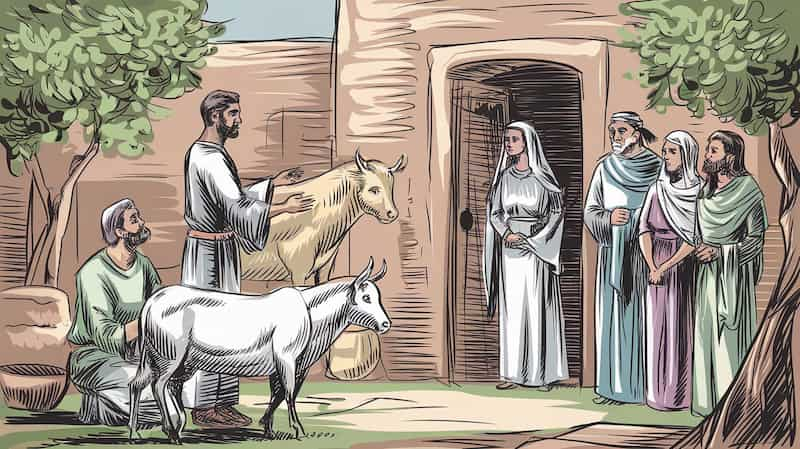
In biblical times, a man who wanted to marry would first need to pay a bride price to the woman’s family. This payment, called a mohar in Hebrew, wasn’t about buying the bride. Instead, it helped compensate her family for raising her and showed that the groom could provide for his new wife.
Let’s look at Jacob’s story – it gives us one of the most detailed examples of a bride price in the Bible. Jacob fell in love with Rachel, the daughter of his uncle Laban. Since Jacob didn’t have money to pay the bride price, he offered to work for Laban for seven years in exchange for Rachel’s hand in marriage.
The Bible tells us something touching about Jacob’s love for Rachel: “So Jacob served seven years to get Rachel, but they seemed like only a few days to him because of his love for her” (Genesis 29:20). However, on the wedding night, Laban tricked Jacob. He gave his older daughter Leah to Jacob instead of Rachel.
When Jacob discovered the deception the next morning, he confronted Laban. His uncle then offered him a deal – he could marry Rachel too, but only if he agreed to work another seven years. Jacob accepted, and he ended up serving fourteen years total as a bride price for his two wives.
Sometimes, the bride price took unusual forms. Take David’s story, for example. When he wanted to marry Saul’s daughter Michal, King Saul set a strange bride price. He demanded “a hundred Philistine foreskins” (1 Samuel 18:25). Saul hoped this dangerous task would lead to David’s death, but David successfully met the challenge and won his bride.
The bride price served several practical purposes. First, it protected women by making divorce expensive – a man would think twice before divorcing his wife because he’d lose his initial investment. Second, it ensured the groom was responsible and could provide for a family. Third, it compensated the bride’s family for losing a valuable member of their household.
Scripture References: Genesis 29:15-30, Exodus 22:16-17, 1 Samuel 18:25
The Betrothal Period
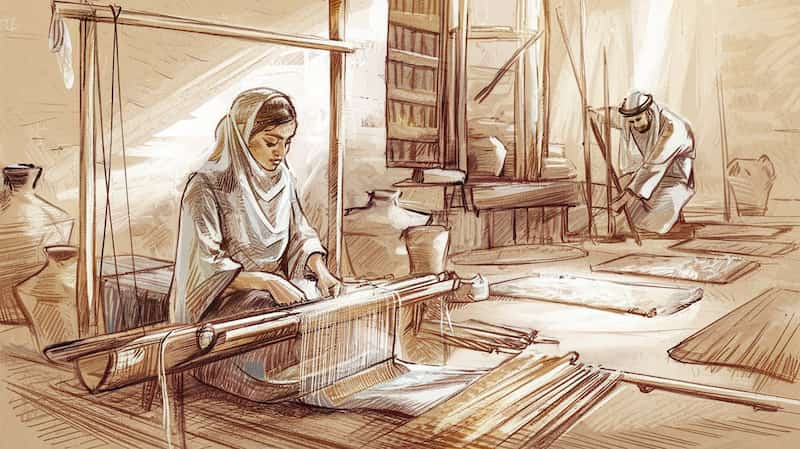
The betrothal in biblical times was very different from modern engagements. Once a couple was betrothed, the law considered them married. They didn’t live together yet, and the marriage wasn’t consummated, but their commitment was legally binding.
Let’s look at the most famous example – Mary and Joseph’s betrothal. The Bible tells us clearly what happened: “His mother Mary was pledged to be married to Joseph, but before they came together, she was found to be pregnant through the Holy Spirit” (Matthew 1:18).
When Joseph learned about Mary’s pregnancy, he faced a serious dilemma. Even though they hadn’t completed the marriage ceremony, he would need to legally divorce Mary to end their relationship. The Bible tells us he planned to divorce her quietly to avoid public shame.
This situation shows us how serious the betrothal was. It took an angel appearing to Joseph in a dream to convince him to continue with the marriage. The angel explained that Mary’s pregnancy was through the Holy Spirit, not from unfaithfulness.
A typical betrothal period lasted about a year. During this time, the couple had all the obligations of marriage but lived separately. The bride would prepare her wedding clothes and learn household duties. The groom would prepare their new home and gather the resources needed for married life.
The betrothal period served several practical purposes. It gave both families time to prepare for the wedding celebration. It allowed the couple to demonstrate their faithfulness. It also protected the bride’s reputation by giving a proper time of transition from her father’s house to her husband’s home.
Scripture References: Matthew 1:18-25, Deuteronomy 22:23-27
The Wedding Feast
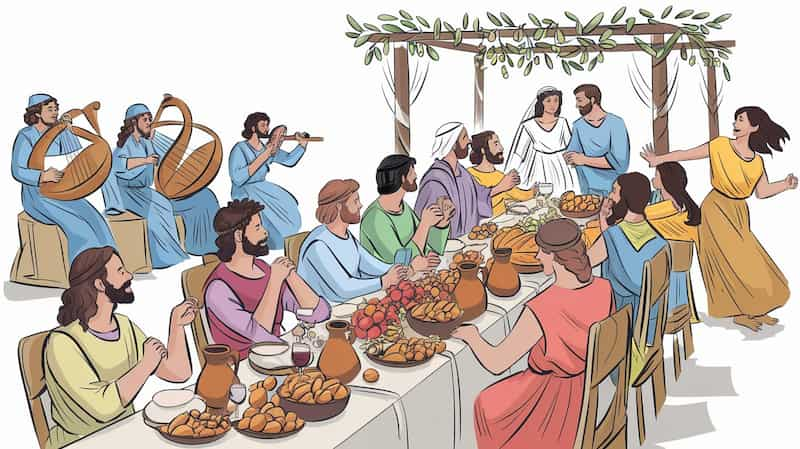
Wedding celebrations in biblical times weren’t quick ceremonies. They often lasted an entire week. These feasts brought whole communities together to celebrate the new marriage.
The wedding at Cana gives us a detailed look at these celebrations. Jesus, his mother, and his disciples attended this wedding feast. During the celebration, the hosts ran out of wine – a serious social embarrassment in that culture.
Jesus’ mother came to him for help. Although he initially seemed reluctant, he performed his first miracle there. He turned six large stone jars of water into fine wine. Each jar held 20 to 30 gallons, showing us how large these celebrations could be.
The size of wedding feasts varied based on the families’ wealth and status. Poor families might celebrate for one day, while wealthy families could feast for a full week. The groom’s family usually hosted and paid for the celebration.
Jesus often used wedding feasts in his teachings. In one parable, he compared God’s kingdom to a king hosting a wedding banquet for his son. The story shows how elaborate these celebrations were – the king in the parable prepared oxen and fattened cattle for the feast.
These long celebrations served important social purposes. They gave the community time to celebrate with the couple. They allowed distant relatives to travel and participate. They also marked the important transition of both families joining together through marriage.
Scripture References: John 2:1-11, Matthew 22:1-14
The Friend of the Bridegroom
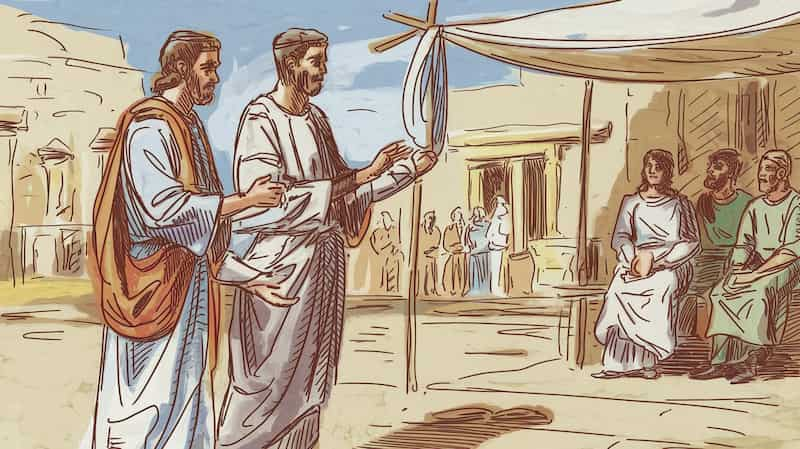
The friend of the bridegroom in biblical weddings had much more responsibility than today’s best man. He played a key role throughout the entire marriage process, from engagement to the wedding celebration.
John the Baptist used this custom to explain his relationship with Jesus. He said, “The bride belongs to the bridegroom. The friend who attends the bridegroom waits and listens for him, and is full of joy when he hears the bridegroom’s voice. That joy is mine, and it is now complete” (John 3:29).
The friend of the bridegroom had specific duties before the wedding. He carried messages between the bride and groom during the betrothal period. He helped negotiate the bride price. He also made sure all wedding preparations were properly handled.
During the wedding celebration, this friend had even more responsibilities. He supervised the feast arrangements. He announced the bridegroom’s arrival to the wedding party. He also guarded the bridal chamber, ensuring the couple’s privacy and safety.
Jesus himself referred to this custom in a conversation about fasting. When people asked why his disciples didn’t fast, he compared himself to a bridegroom. He explained that his followers couldn’t fast while he was with them, just as wedding guests celebrate when the bridegroom is present.
Scripture References: John 3:29, Matthew 9:15
The Bride’s Veil
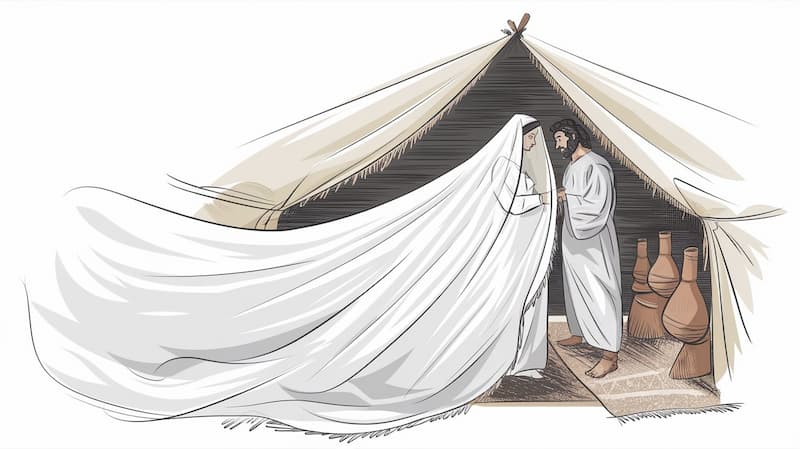
The bridal veil held deep significance in biblical weddings. It wasn’t just a piece of clothing – it symbolized the bride’s position and marked her transition into marriage.
We see this custom clearly in Rebekah’s story. When she first saw Isaac in the distance, she asked who he was. Upon learning it was her future husband, she took her veil and covered herself. This action showed her modesty and readiness for marriage.
The veil played a crucial role in Jacob’s story too. Laban used the wedding veil to trick Jacob into marrying Leah instead of Rachel. Because the bride remained veiled throughout the ceremony and into the night, Jacob didn’t realize he had married the wrong sister until morning.
Brides wore their veils from the start of the ceremony until the marriage was consummated. The veil separated the bride from everyone except her husband. When the husband lifted the veil in the privacy of their chamber, it marked the beginning of their life together.
The length and thickness of the veil varied by region and custom. Some veils covered the bride from head to toe. Others covered just her face. But all served the same basic purpose – to set the bride apart as special on her wedding day.
Scripture References: Genesis 24:62-67, Genesis 29:22-26
The Marriage Consummation
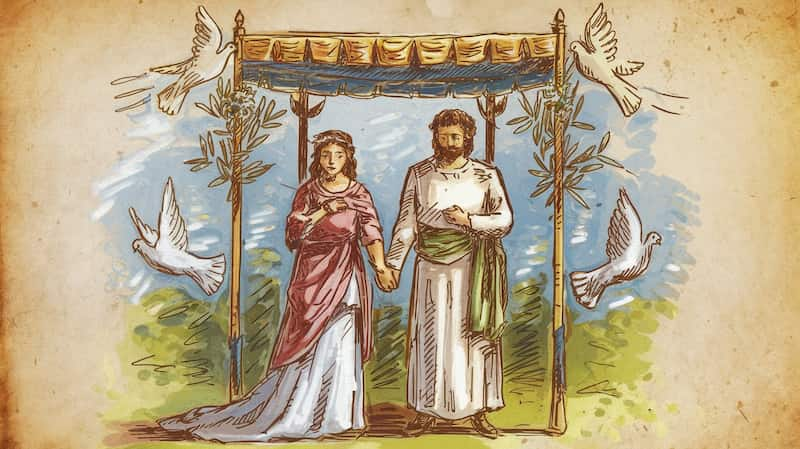
The consummation of marriage in biblical times involved customs that might surprise us today. The completion of the marriage wasn’t just a private matter between husband and wife – it had public aspects that protected both parties.
The Bible describes specific laws about proving a bride’s virginity. The bride’s parents kept the bloodstained cloth from the wedding night. This might seem strange to us, but it served as proof of the bride’s purity and protected her from false accusations.
Deuteronomy 22 explains what happened if a man accused his new wife of not being a virgin. The bride’s parents would bring the proof of her virginity to the town elders. If they proved her innocence, the husband would be punished for falsely accusing his wife. He would have to pay a fine to his father-in-law and could never divorce his wife.
However, if the accusations were true, the consequences were severe. This shows how seriously the community took marriage and moral purity. The public nature of these customs helped prevent false accusations and protected the reputation of innocent brides.
Scripture References: Deuteronomy 22:13-21
These six wedding customs from the Bible – the bride price, betrothal period, wedding feast, friend of the bridegroom, bridal veil, and marriage consummation – paint a detailed picture of marriage in biblical times. Each custom served practical purposes and protected both families involved in the marriage.
In biblical times, marriage stood as a sacred covenant that involved entire communities. These six wedding customs from the Bible we’ve explored show us how seriously people took this commitment. Each tradition served to protect and honor marriage.
The bride price ensured the groom could provide for his family. The long betrothal period gave couples time to prepare. Week-long celebrations allowed communities to witness and support the new union.
Most importantly, people viewed marriage as a binding covenant before God, not just a human arrangement. These wedding customs reflected a deep understanding that marriage was more than just a ceremony – it was a sacred institution designed by God to create strong families and stable communities.
Today, our society has moved far from this understanding of marriage. Many see it as a simple contract that can be broken when things get difficult. Couples often enter marriage with little preparation, and some even plan for divorce by signing prenuptial agreements.
Through the prophet Malachi, God makes His stance clear: “I hate divorce” (Malachi 2:16), and Jesus reminds us “What God has joined together, let no one separate” (Mark 10:9). Yet divorces continue to increase, breaking families and affecting children’s lives.
The root of this problem often lies in how couples have replaced God with careers, personal ambitions, and worldly pleasures as the center of their marriage. A marriage without God at its center is like a house built on sand – it cannot withstand life’s storms.
As Christians today, we need to return to viewing marriage as the sacred covenant God designed it to be. This means putting God at the center of our marriages, taking time to prepare for marriage, working through difficulties instead of giving up, and supporting other married couples in our community.
When we honor marriage as God intended, with Him as our foundation, we create stronger families, healthier communities, and a living picture of Christ’s faithful love for His church.

